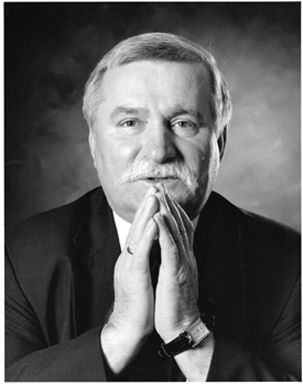Lech Wałęsa: Solidarity Champion, Symbol of Polish Independence
Lech Wałęsa, born on September 29, 1943, in Popowo, Poland, is a key figure in the history of Poland and the broader struggle for workers’ rights and political freedom. Rising from a shipyard electrician to the President of Poland, Wałęsa played a vital role in the Solidarity movement and the eventual collapse of communist rule in Eastern Europe. This article explores his life, achievements, and enduring impact on Poland.
Early Life and Activism
Shipyard Electrician
Lech Wałęsa, originally trained as an electrician, began his career at the Gdańsk Shipyards. His early experiences as a labor activist laid the foundation for his later role in the struggle for workers’ rights.
Formation of Solidarity
In 1980, Wałęsa emerged as a leader during the Gdańsk Shipyard strikes, leading to the formation of the independent trade union “Solidarity.” This movement, rooted in workers’ rights and democratic ideals, became a powerful force challenging communist rule.

Solidarity Movement and Struggle for Freedom
Social and Political Impact
Solidarity grew into a nationwide movement advocating for political pluralism, free elections, and the end of one-party rule. The movement’s influence extended beyond Poland, inspiring similar movements throughout Eastern Europe.
Declaration of Martial Law
In 1981, the Polish government, threatened by Solidarity’s growing influence, declared martial law, attempting to suppress the movement. Despite this setback, Solidarity persisted as an underground force, resisting communist oppression.
Transition to Democracy
Round Table Talks
The late 1980s saw a shift towards political reforms. Lech Wałęsa participated in the Round Table Talks in 1989, a series of negotiations between the communist government and opposition forces. These talks paved the way for the first semi-free elections in Poland since World War II.
Historic Presidential Victory
In 1990, Lech Wałęsa won the presidential election, becoming the first democratically elected president of Poland. His victory marked the end of communist rule and the beginning of Poland’s transition to a democratic state.
Challenges and Controversies
Economic Reforms and Social Challenges
As president, Wałęsa faced challenges in implementing economic reforms and addressing social issues. His presidency was marked by both achievements and controversies as Poland navigated the complexities of post-communist transition.
Post-Presidential Period
After leaving office in 1995, Lech Wałęsa remained active in public life but faced criticism for certain political decisions. His legacy is a subject of ongoing debate in Polish politics.
Legacy and Recognition
Nobel Peace Prize
In 1983, Lech Wałęsa was awarded the Nobel Peace Prize for his role in the peaceful struggle for workers’ rights and political freedom. The prize symbolized global recognition of Solidarity’s impact on the quest for democracy.
Symbol of Independence
Lech Wałęsa is widely regarded as a symbol of Poland’s fight for independence and democracy. His legacy continues to inspire those who champion human rights, democratic values, and social justice.
Conclusion
Lech Wałęsa’s journey from a shipyard electrician to the President of Poland is a testament to the power of grassroots movements in bringing about transformative change. His leadership during the Solidarity movement left an indelible mark on Poland’s history, contributing to the collapse of communism in Eastern Europe and the establishment of democratic governance. Despite the complexities of his post-presidential period, Lech Wałęsa remains a symbol of freedom and resilience in the face of adversity.
Frequently Asked Questions
Who is Lech Wałęsa? Lech Wałęsa is a key figure in Polish history, known for his role as a leader in the Solidarity movement and as a symbol of Polish independence.
What is Solidarity? Solidarity was a trade union and social movement in Poland, led by Lech Wałęsa. It played a crucial role in challenging and eventually overcoming communist rule.
Why is Lech Wałęsa significant? Lech Wałęsa played a pivotal role in challenging communist rule, leading to the establishment of a democratic government in Poland and inspiring similar movements worldwide.
When did Lech Wałęsa rise to prominence? Lech Wałęsa gained prominence in the 1980s when he led the Solidarity movement, contributing to the end of communist rule in Poland.
What is Lech Wałęsa’s legacy? Lech Wałęsa is remembered as a champion of freedom, democracy, and workers’ rights. His legacy extends beyond Poland, inspiring movements for liberty globally.
Was Lech Wałęsa awarded for his efforts? Yes, Lech Wałęsa was awarded the Nobel Peace Prize in 1983 for his leadership in the Solidarity movement and his contribution to peaceful democratic change.
How did Lech Wałęsa contribute to Polish independence? Lech Wałęsa’s leadership in the Solidarity movement played a vital role in challenging communist rule, leading to the establishment of a democratic government in Poland.
What challenges did Lech Wałęsa face? Lech Wałęsa faced numerous challenges, including imprisonment and political persecution, in his pursuit of democratic ideals and workers’ rights.
How is Lech Wałęsa remembered in Poland? Lech Wałęsa is highly regarded in Poland as a national hero and symbol of the country’s struggle for independence and democracy.
Can I visit places associated with Lech Wałęsa in Poland? Yes, several sites in Poland, including the European Solidarity Centre in Gdańsk, commemorate Lech Wałęsa’s legacy and the Solidarity movement.









